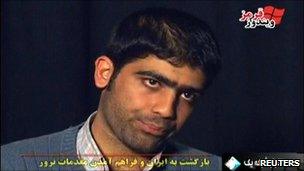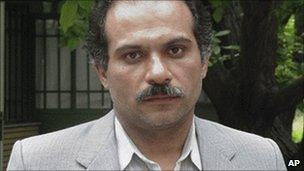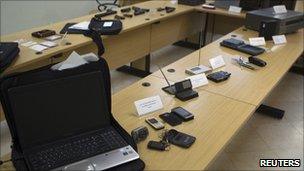Behind the 'Mossad plot' against Iranian scientist
- Published

Majid Jamali Fashi delivering his "confession" on Iranian television
What kind of canapes should you serve at the leaving do for an undercover agent from your country's greatest enemy? What sort of thing constitutes appropriate chit-chat for such an occasion?
These are some many intriguing questions left dangling by the story of one of the men arrested for the assassination of an Iranian nuclear scientist in January 2010.
On 10 January Iran announced that it had arrested 10 of its own citizens for the killing of Professor Massoud Ali Mohammadi. Iran's Intelligence Ministry said that the 10 suspects worked for Israel's intelligence service Mossad.
Iran's state-run TV channels have broadcast the alleged confession of one of the arrested men, named as Majid Jamali Fashi.
The suspected agent was shown speaking in a room with a dark background. It is impossible to verify the version of events that he outlined.
Mr Jamali Fashi explained that, about three years ago, a contact of his suggested that he approach the Israeli Consulate in Istanbul. Exactly why he wanted to make this approach is not clear. But he did so, and said that he was questioned by Israeli agents.
"They asked all the details of my life precisely. And also, they offered me to co-operate with them on their plans and asked me to gather information from inside Iran."
'Training in Israel'
So, Mr Jamali Fashi returned to Iran and began to collect information about military bases. He then made several trips between Iran and Turkey to share the intelligence he had gathered.
Later, he began to meet his handlers in Bangkok. On one trip Mr Jamali Fashi said that he was given an IQ test by a doctor.

Massoud Ali Mohammadi was killed in a bomb blast a year ago as he left his home
At this point he was given a laptop computer which had a secret method of storing information. When he returned to Iran, he said that he used the laptop to send encoded messages to his handlers.
He was then asked to fly to Azerbaijan. From there, he said that he was given an Israeli passport and identity, flown to Tel Aviv and driven to a military base. There he was given weapons training and taught how to use a motorbike.
"They gave me some training during that trip such as chase and counter chase, chasing cars, getting information on a particular place and sticking bombs under cars," Mr Jamali Fashi said in a confession broadcast on Iranian TV Channel Two.
'Planting the bomb'
After several days of training, his handlers told him that he had a target - Massoud Ali Mohammadi, a professor at the Department of Physics at the University of Tehran. He explained that they wanted him to plant a motorcycle bomb outside the professor's house.
"They showed me a small model of the (professor's) house for the first time. It was the exact copy of the real one, even the size, material, its colour, the tree next to it, its asphalt, the street kerb, and the bridge," the detained man said.

Iran claims to have found the weapons and communications equipment behind the killing
The night before he was due to leave Israel, his handlers threw him a farewell party. What they served, and what the guests talked about is not recorded.
Majid Jamali Fashi then made it back to Iran. Some time before the morning of 12 January 2010, the country's authorities allege that his network parked a motorcycle outside the house of Prof Ali Mohammadi in the Qetariyah district of north Tehran. Attached to this motorcycle was a bomb which could be detonated by remote control.
On the morning of 12 January, the professor left home to go to work. He was scheduled to give a lecture at 8am at the University of Tehran. But he never made it more than a few steps past his front door. The bomb in the motorbike exploded, killing the professor.
More questions than answers
Now, almost a year later, Iran says that the agents responsible for the killing are under arrest.
But the arrest and the confession shown on TV leave a number of unanswered questions. When and where were the suspected agents detained? How were they discovered?
Of course, there is a much bigger question to ask as well. Is the allegation that they worked for Mossad true or false?
When one side presents a detailed set of allegations, it's basic practice to check the charges with the other side. However in this case, that's not possible.
Like most intelligence agencies, Mossad does not comment on allegations of its activities - either to confirm them or to deny them. Israeli government officials have declined to comment.
And in Iran, opposition sources have claimed the professor was killed by the government because of his support for them.
So, for now, we're left with one dead scientist, 10 men under arrest, and the story of an agent who was the guest of honour at his own undercover farewell party.
- Published10 January 2011
- Published29 November 2010
- Published28 December 2010